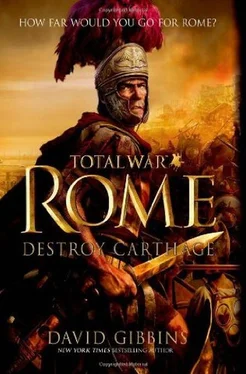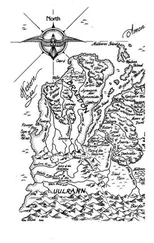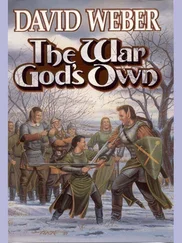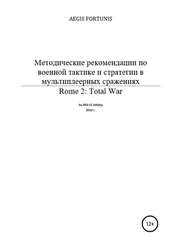David Gibbins - Total War Rome - Destroy Carthage
Здесь есть возможность читать онлайн «David Gibbins - Total War Rome - Destroy Carthage» весь текст электронной книги совершенно бесплатно (целиком полную версию без сокращений). В некоторых случаях можно слушать аудио, скачать через торрент в формате fb2 и присутствует краткое содержание. Год выпуска: 0101, Издательство: Thomas Dunne Books, Жанр: Исторические приключения, на английском языке. Описание произведения, (предисловие) а так же отзывы посетителей доступны на портале библиотеки ЛибКат.
- Название:Total War Rome: Destroy Carthage
- Автор:
- Издательство:Thomas Dunne Books
- Жанр:
- Год:0101
- ISBN:нет данных
- Рейтинг книги:5 / 5. Голосов: 1
-
Избранное:Добавить в избранное
- Отзывы:
-
Ваша оценка:
- 100
- 1
- 2
- 3
- 4
- 5
Total War Rome: Destroy Carthage: краткое содержание, описание и аннотация
Предлагаем к чтению аннотацию, описание, краткое содержание или предисловие (зависит от того, что написал сам автор книги «Total War Rome: Destroy Carthage»). Если вы не нашли необходимую информацию о книге — напишите в комментариях, мы постараемся отыскать её.
Total War Rome: Destroy Carthage — читать онлайн бесплатно полную книгу (весь текст) целиком
Ниже представлен текст книги, разбитый по страницам. Система сохранения места последней прочитанной страницы, позволяет с удобством читать онлайн бесплатно книгу «Total War Rome: Destroy Carthage», без необходимости каждый раз заново искать на чём Вы остановились. Поставьте закладку, и сможете в любой момент перейти на страницу, на которой закончили чтение.
Интервал:
Закладка:
David Gibbins
Total War Rome: Destroy Carthage
Introductory Note
In the second century BC Rome was still a republic, ruled by wealthy patricians whose families traced their ancestry back to the first years of the city some six hundred years earlier. The republic had been formed when the last king of Rome was ousted in 509 BC, and it was to survive until the establishment of the empire under Augustus towards the end of the first century BC. The main administrative body was the Senate, led by two annually elected consuls. Outside the Senate were twelve elected tribunes, representatives of the common people (the plebs ), who had power of veto over the Senate. The complex alliances and rivalries between the patrician families (the gentes, singular gens ), as well as between the patricians and the plebs, are crucial to understanding the history of Rome at this period, at a time when overseas conquest gave a tempting vision of personal power to generals that eventually led to civil war in the first century BC and to Octavian proclaiming himself Augustus. Why the establishment of an empire should not have happened more than a century earlier, when Rome’s armies stood supreme and its most outstanding general, Scipio Aemilianus Africanus, had the world at his feet, is one of the most fascinating questions of ancient history and the backdrop to the story in this novel.
The Roman army at this date was not yet a professional force; legions were called up from among the citizens of Rome in response to particular crises. The army would only take on a professional guise during times of protracted war, when the advantages of keeping a standing army would have become apparent. Throughout the second century BC, the period of this novel, a tension existed between those who feared that the development of a professional army could lead to military dictatorship, and those who saw it as a necessity if Rome were to hold its own on the world stage. Eventually, the latter won out, leading to the army reforms of the consul Marius in 107 BC and the establishment of the first permanent legions.
At the time of this novel, the familiar legion titles of the imperial period, such as ‘Legio XX Valeria Victrix’, did not yet exist; legions raised for particular campaigns and disbanded afterwards might have a number, but would not carry forward their identity. The main formation within a legion was the maniple, a unit discarded by Marius in favour of the smaller cohort. The maniple might be equated with the ‘wing’ of a Victorian British regiment, a formation about half the size of a modern infantry battalion that was faster to deploy and more manoeuvrable in battle. The main unit within the maniple was the century, roughly equivalent to a modern infantry company. Traditionally, the men within a legion were classed by wealth and age, from the poorest velites (skirmishers) through the hastati and principes to the wealthiest triarii, with each category corresponding to increasing quality of armour and equipment, as well as to positions in the line of battle that were generally more exposed and dangerous for the poorer and more lightly equipped troops.
Centuries were commanded by centurions — men who had risen through the ranks based on ability and experience. They held responsibility similar to that of a modern-day infantry captain, but are best seen as non-commissioned officers. The primipilus (‘of the first file’) was the senior centurion in a legion, the equivalent of a regimental sergeant-major. Another common rank was optio, a subordinate rank to centurion with responsibility similar to that of a lieutenant but best seen as a sergeant or corporal. A wide social gulf existed between these men and the more senior officers in the legion, who came from patrician families for whom military appointments were part of the cursus honorum (the ‘course of offices’), the sequence of military and civil offices that a wealthy Roman male would hope to hold through his lifetime. The middle-ranking officers of a legion were the military tribunes, young men at the start of their careers or older men who had volunteered in time of crisis to serve in the army but were not yet at the stage in the cursus honorum where they could command a legion. That role went to the legatus, the equivalent of a colonel or brigadier, who might command several thousand men in the field, including attached cavalry and allied forces.
There was no rank of general, because armies were commanded by a praetor, the second highest civil rank in Rome, or by one of the consuls. The competence of an army commander was therefore a matter of chance, as military prowess was not necessarily a prerequisite for the highest civil office; the ability of an army commander might depend on whether there had been opportunities for active service earlier during his career. However, with war in the offing, a man might be elected to the consulship on the basis of his military reputation, and the law restricting the repeat holding of office temporarily overturned to allow the re-election of a man who had proved to be an able general.
This system worked well enough to allow Rome her military successes in the second century BC, but veterans would have been acutely aware of its deficiencies, including the absence of formal schooling in war for young men before they were appointed tribune and sent into the field. Equally pressing was the lack of continuity among the legionaries, as they were discharged after campaigns and much accumulated knowledge was lost in the intervals between wars. When the call to arms came again, men might go not so much for professional pride or for the glory of war but for the chance of booty, an increasing attraction with the wars of conquest in Greece and the east bringing much visible wealth into Rome at this period.
At the time of this novel, Rome was engaged in two great wars of conquest: one against the kingdoms in Macedonia and Greece that had grown out of Alexander the Great’s empire, and the other against the North African people whom the Romans called ‘Punic’, their term for the descendants of Phoenician seafarers from the area of modern Lebanon who had established the city of Carthage some seven hundred years before. Rome fought three wars against Carthage, in 264–261 BC, 218–201 BC and 149–146 BC, progressively taking Carthaginian overseas territories in Sardinia and Sicily and Spain until Carthage was left with little more than her hinterland in modern Tunisia, hemmed in by Rome’s Numidian allies. The Second Punic War, when the Carthaginian general Hannibal marched with his elephants through Spain and over the Alps towards Rome, is perhaps the most famous of these campaigns, yet because it left Carthage intact was really only the stage-setting for one of the most devastating events in ancient history some fifty years later when Rome finally made the decision to destroy her enemy altogether.
By the time of the final assault on the city in 146 BC and on Corinth in Greece in the same year, Rome was poised for domination of the ancient world, held back only by a constitution that had been designed to manage a city-state and not an empire. For the modern war-gamer this period is one of the most fascinating in antiquity, a time when small changes could have altered the course of history, and when all of the factors of campaigning come vividly into play: the political backdrop, rivalries and alliances among the patrician gentes of Rome, problems of supply and maintenance of overseas armies, evolving battle tactics on land and at sea, and above all the personalities and ambitions of some of the most powerful individuals in history, in a period that is only imperfectly known from the ancient sources and therefore leaves much open to speculation and gameplay.
Читать дальшеИнтервал:
Закладка:
Похожие книги на «Total War Rome: Destroy Carthage»
Представляем Вашему вниманию похожие книги на «Total War Rome: Destroy Carthage» списком для выбора. Мы отобрали схожую по названию и смыслу литературу в надежде предоставить читателям больше вариантов отыскать новые, интересные, ещё непрочитанные произведения.
Обсуждение, отзывы о книге «Total War Rome: Destroy Carthage» и просто собственные мнения читателей. Оставьте ваши комментарии, напишите, что Вы думаете о произведении, его смысле или главных героях. Укажите что конкретно понравилось, а что нет, и почему Вы так считаете.












